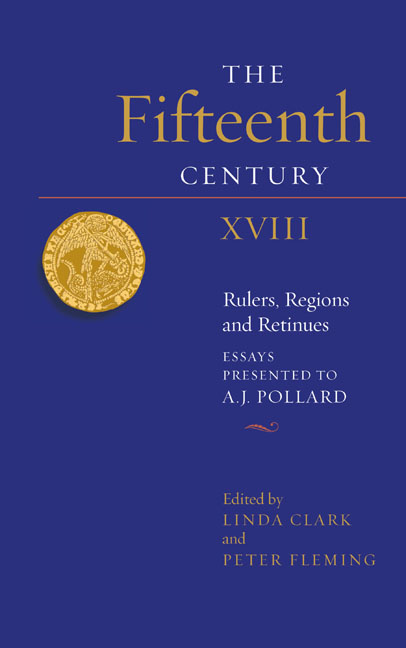Greater Landowners and the Management of their Estates in Late Medieval England
Published online by Cambridge University Press: 24 November 2020
Summary
Historians tend to think of the nobility as a military class – as indeed they would ultimately have defined themselves – and also as the social and cultural elite, as courtiers and councillors in relation to the crown, as inheritors and transmitters of their patrimony, but rarely as men of business. A mention of Anthony Wydeville, Earl Rivers, might conjure up in the modern mind an image of a chivalric jouster or a courtier/politician, but usually not an image of a man very much on top of his business affairs, despite the fact that his surviving correspondence shows him to be all of these things. The extent to which lords and ladies were involved with their estates and finances is a question that is often tentatively addressed by individual studies of landlords and landladies but less frequently by historians in a more general sense, despite the pithy remarks of K.B. McFarlane on the subject, although those that do tend to infer some lordly involvement in estate and financial management. This lack of investigation is in some contrast to consideration of the lesser gentry, where historians have argued for ‘personal decision making and the lightness of bureaucracy’. Clearly, the participation of greater landowners in the administration of their estates would have varied from individual to individual, but the evidence makes both case studies and any attempt at generalisations about the attitudes and expectations of the whole class rather difficult. The evidence tends to come in two forms. One is the manuals of instruction drawn up for lords and ladies detailing how they should conduct themselves in every aspect of their lives, including in their role as landlords and heads of households. While these shed light on how (some) contemporaries considered the question of the extent to which lords ought to be involved in their estates and finances, such works of instructions were idealistic and in part unrealistic, as indeed Dorothea Oschinsky, who worked extensively on these manuals in the mid twentieth century, admits. Yet the second type of evidence, the financial records of estate administration, is even more difficult to interpret, as these usually deliberately obscured agency behind the formal veil of lordly authority and on a number of levels require the historian to spend considerable time distinguishing fiction from reality.
- Type
- Chapter
- Information
- The Fifteenth Century XVIIIRulers, Regions and Retinues. Essays presented to A.J. Pollard, pp. 93 - 104Publisher: Boydell & BrewerPrint publication year: 2020

